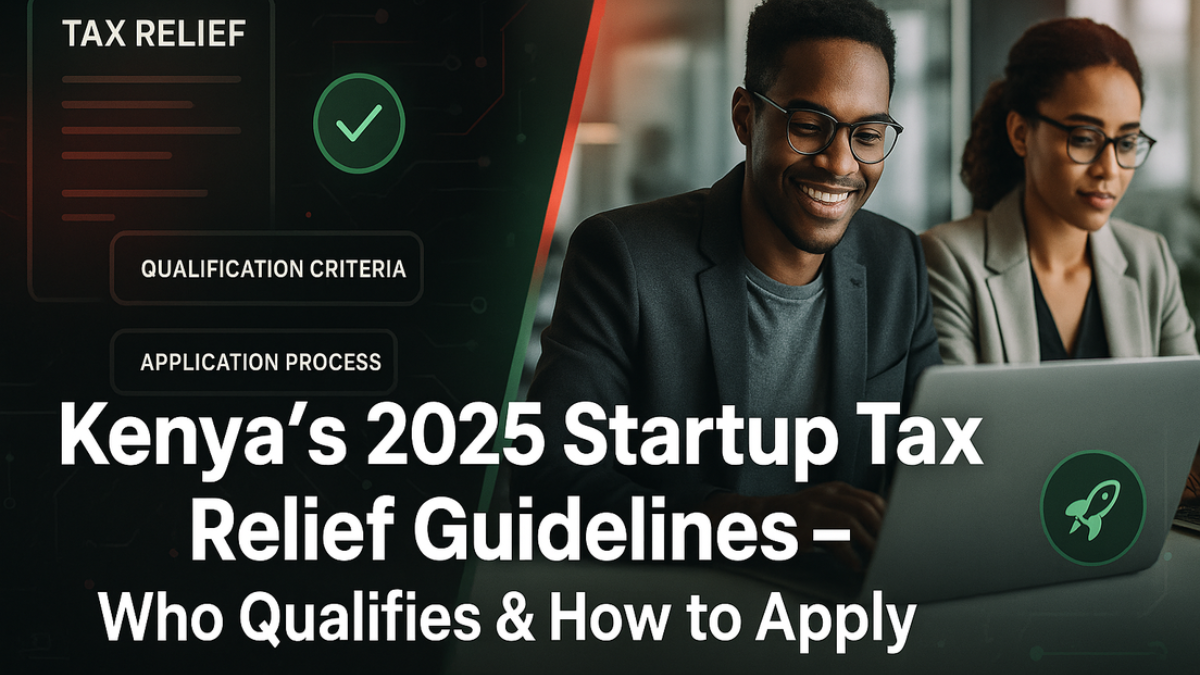Kenya’s startup ecosystem has become one of Africa’s most vibrant, driven by innovations in fintech, agritech, healthtech, and e-commerce. But for many entrepreneurs, high operating costs and heavy tax burdens have been significant barriers to growth. In response, the government has introduced the Kenya startup tax relief 2025 program, a policy designed to reduce financial pressure on young businesses and encourage long-term sustainability. This initiative is a major step under Kenya’s Startup Act framework, aiming to provide relief and attract more investment into the sector.

Why Tax Relief for Startups Matters
Startups often operate with limited resources, especially in their early years. High taxes can drain capital that could otherwise be invested in product development, hiring, or scaling operations. The Kenya business tax exemption policy recognizes these challenges and seeks to provide a supportive environment for innovators. By lowering costs, the government hopes to drive entrepreneurship, reduce unemployment, and strengthen Kenya’s reputation as a regional tech hub.
Key Features of the 2025 Startup Tax Relief
The tax relief policy is designed with specific measures to support startups during their critical growth years. Some of the key features include:
-
Corporate Tax Exemption: Eligible startups will enjoy a full or partial exemption from corporate income tax for their first three years of operation.
-
VAT Exemption: Startups in priority sectors such as technology, healthcare, and agriculture will not be required to pay Value Added Tax (VAT) on essential services and equipment.
-
Import Duty Waivers: Businesses importing tech equipment, renewable energy systems, or medical devices will benefit from reduced import duties.
-
Capital Gains Tax Relief: Investors in eligible startups may qualify for tax reductions on returns from capital gains, boosting funding opportunities.
-
Employment Tax Incentives: Startups that hire young graduates or interns will be eligible for payroll tax credits.
Together, these measures create a comprehensive financial cushion for emerging businesses.
Who Qualifies for the Relief?
Not every business will qualify for the Kenya startup tax relief 2025. The government has outlined specific eligibility criteria:
-
The business must be incorporated in Kenya and recognized as a startup under the Startup Act.
-
It should be less than five years old at the time of application.
-
Annual revenue must not exceed a set threshold (currently pegged at KSh 50 million).
-
The startup must be engaged in innovation-driven sectors such as technology, healthcare, education, agriculture, renewable energy, or creative industries.
-
Founders must be Kenyan citizens or registered residents with majority local ownership.
These conditions ensure that relief targets genuine startups rather than established corporations.
How to Apply for Tax Relief
Applying for tax relief requires a clear process, designed to be transparent and accessible:
-
Business Registration: Ensure your startup is registered with Kenya’s Business Registration Service (BRS).
-
Startup Act Recognition: Apply for certification under the Startup Act to prove eligibility.
-
Tax Authority Submission: Submit an application to the Kenya Revenue Authority (KRA), including financial statements, proof of incorporation, and sector activity details.
-
Approval & Certification: Once verified, the startup receives a tax relief certificate valid for three years.
-
Annual Compliance: To maintain benefits, startups must file annual tax returns and update records with the KRA.
This streamlined process reduces bureaucracy while ensuring accountability.
Benefits for Entrepreneurs
The Kenya business tax exemption offers several advantages for entrepreneurs:
-
Lower Operating Costs: Reduced taxes free up funds for reinvestment.
-
Faster Growth: Startups can scale more quickly with additional capital.
-
Increased Investor Confidence: Tax incentives make Kenyan startups more attractive to both local and foreign investors.
-
Job Creation: Employment tax incentives encourage hiring, reducing youth unemployment.
-
Global Competitiveness: Kenya positions itself as a favorable destination for entrepreneurship compared to other African nations.
These benefits will not only strengthen individual businesses but also create ripple effects across the wider economy.
Potential Challenges
While the initiative is promising, certain challenges may arise:
-
Awareness Gap: Many small startups in rural areas may not know about the program.
-
Compliance Requirements: Startups must maintain detailed financial records, which may be challenging for very early-stage ventures.
-
Limited Scope: Businesses outside priority sectors may feel excluded.
-
Risk of Abuse: Some established companies could attempt to misuse the policy by registering shell startups.
The government has pledged to address these challenges with awareness campaigns, training programs, and strict enforcement of eligibility checks.
Impact on Kenya’s Startup Ecosystem
The introduction of the Kenya startup tax relief 2025 has already sparked optimism among entrepreneurs and investors. Analysts predict it could significantly increase startup survival rates, attract more venture funding, and establish Kenya as a leader in Africa’s digital economy. By reducing one of the biggest barriers—taxation—the government is paving the way for a more vibrant and resilient entrepreneurial landscape.
Final Thoughts
The Kenya business tax exemption is a landmark policy for young entrepreneurs. By offering relief from corporate taxes, VAT, and import duties, it directly addresses financial challenges faced by startups. More importantly, it creates an environment where innovation can thrive. For founders, this is not just about saving money—it is about having the freedom to focus on building products, hiring talent, and growing sustainably. With careful implementation and strong compliance, Kenya’s 2025 tax relief policy could mark the beginning of a golden era for startups in the country.
FAQs
What is the Kenya startup tax relief 2025?
It is a government policy that provides corporate tax exemptions, VAT waivers, and other incentives to eligible startups.
How long can startups enjoy the exemption?
Most benefits last for the first three years of a startup’s operation, subject to compliance with regulations.
Do foreign-owned startups qualify?
Only startups with majority local ownership are eligible under the policy.
Can startups in non-tech sectors apply?
Yes, but priority is given to innovation-driven sectors such as health, agriculture, renewable energy, and education.
Click here to know more.
